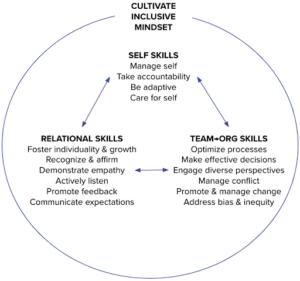Take a moment to reflect on your past experiences with a manager. How did their management style impact your daily work life? Did they provide the support and encouragement necessary for you to excel? Were they approachable and invested in your growth, or did you feel overlooked and undervalued? The way a manager interacts with their team can significantly influence the team’s motivation and productivity.
According to a recent UKG report, nearly three in four employees say their manager’s support, encouragement, and leadership directly motivate them to go above and beyond at work. That’s because inclusive leadership is a management approach that values and respects the variety of perspectives, ideas, and backgrounds of individuals within a team or organization. It involves creating an environment where everyone feels included, heard, and valued.
Inclusive leaders understand the importance of diversity and actively seek out different perspectives and experiences. They recognize that diversity brings unique strengths and insights that can drive innovation and improve decision-making.
To become an inclusive leader, it is crucial to develop self-awareness and challenge any biases or assumptions you may have. It requires continuously educating yourself about different cultures, identities, and perspectives to better understand and empathize with others. The good news is that inclusive leaders are made, not born.
Praxis Labs’ Inclusive Leadership Framework
Praxis Labs’ team has developed a comprehensive Inclusive Leadership Framework that breaks down the essential inclusive leadership skills for fostering collaboration and peak performance within organizations. These skills have been identified through an extensive review of academic research on inclusive leadership over the last two decades, highlighting the positive impact of inclusive leadership practices on engagement, retention, individual and team performance, and overall organizational success.
The framework is structured around 16 core skills, anchored in the development of an inclusive mindset — an essential precursor for fostering an environment where every individual feels they belong. These skills form three interconnected levels:
- Self Skills
- Relational Skills
- Team and Organizational Skills
The skills outlined in the framework are not isolated, they often overlap and interact, forming clusters of competencies that leaders can develop and refine over time. For example, the ability to manage oneself — a self-skill — includes sub-skills like self-monitoring and emotional regulation, which are critical for leaders to effectively navigate and influence diverse team environments positively.

The Skills of Tomorrow’s Inclusive Leaders
Inclusive leadership includes a practical set of skills that learners can develop, practice, and refine. Here, are the essential skills for inclusive leaders:
Self Skills
Leaders need to be aware of their own feelings and reactions to manage themselves effectively in any environment. It includes understanding your emotions, regulating your reactions, and taking time to reflect on your actions.
Manage Self:
A person’s ability to control their thoughts, feelings, and behaviors. Effective self-management involves recognizing one’s biases and actively working to mitigate their impact on decision-making. A leader might reflect on a past interview to identify any bias patterns and seek training or feedback to improve.
Be Adaptive:
The ability to adjust to new or changing circumstances and flexibly change one’s actions in response. It is crucial in responding constructively to change. A leader could demonstrate adaptability by introducing inclusive meeting norms that better support all employees, like establishing a no-interruption rule so that everyone can share their thoughts fully without being cut off or talked over.
Care for One-Self:
Identifying and engaging in activities that support well-being and protection. Leaders who prioritize their well-being can better support their teams. A manager who sets clear boundaries around work hours helps ensure they’re well-rested and fully present for their team, it also sets a positive example for others.
Take Accountability:
Proactively being answerable to another person or group for one’s decisions or behavior. It sets a powerful example for others on your team. A leader might openly acknowledge a mistake in a project direction and take immediate steps to correct it, fostering a culture of accountability and transparency.
Relational Skills
Building strong, positive relationships is essential for happiness and success. This means understanding what team members need, supporting their growth, and creating a work environment where everyone feels they can contribute.
Foster Individuality & Growth:
Understanding and supporting the unique needs, interests, skills, and motivations of others while supporting and advocating for their development. Supporting individual growth involves recognizing and nurturing each team member’s unique talents. For example, a leader might create personalized development plans that align with each team member’s career aspirations and skills.
Recognize & Affirm:
Observing, identifying, and explicitly acknowledging the strengths, abilities, and efforts of one’s self or others in formal and informal ways. When leaders acknowledge achievements, it helps foster a positive team environment. Ask your team members how they like to receive acknowledgment, whether publicly or privately. Celebrating even small wins in the ways people prefer to receive them helps motivate them to continue achieving.
Demonstrate Empathy:
Understanding, feeling, and/or accurately acknowledging the emotions of another person. Empathy is critical for building stronger connections. Spend time listening to an employee’s concerns about work-life balance and together find a flexible working arrangement that suits the employee’s needs, while ensuring they can accomplish their goals.
Actively Listen:
This refers to engaging in purposeful listening that includes attending to both verbal and non-verbal communication from others, seeking to understand, showing interest, asking open-ended questions, and withholding judgment or interruptions, in order to fully understand what is being said. Active listening involves fully engaging with the speaker and understanding what they’re trying to convey. In meetings, leaders can practice this by summarizing points made by team members, ensuring that everyone feels heard and valued.
Promote Feedback:
Encouraging a culture of feedback enhances growth and improvement. Inclusive feedback is effective feedback. Managers should always seek to understand the root cause behind someone’s good or bad performance so that they can appropriately celebrate or chart a course of action for improvement. An inclusive leader might implement regular, anonymous surveys to gather honest feedback about their leadership style and team dynamics, using those insights to make positive changes.
Communicate Expectations:
Clearly expressing pre-defined, attainable, reasonable, and measurable beliefs about what can and/or should be achieved and the rationales behind them. Communicating expectations in a clear and effective way ensures that team members understand what needs to be accomplished, why it’s important, how it ties into larger organizational goals, and how each person’s contributions are valuable to the project’s success.
Team and Organizational Skills
These focus on making inclusion part of the company’s DNA. It’s about shaping the culture of the team and the organization to be welcoming and supportive of everyone’s contributions.
Optimize Team Processes:
Develop ways of working that inspire and create clarity, cohesion, and psychological safety. Creating efficient team processes involves aligning team activities with broader organizational goals. Consider reevaluating team workflows to ensure they are inclusive and enable all team members to contribute effectively.
Make Effective Decisions:
The cognitive process of competently choosing between two or more alternatives. Inclusive leaders involve their teams in the decision-making process, ensuring diverse perspectives are considered. For example, before finalizing a new policy, a manager could hold a brainstorming session to gather input from all team members.
Encourage Diverse Perspectives:
Behaviors that invite different points of view. Valuing different viewpoints can lead to innovative solutions. A leader could encourage team members from different departments to collaborate on a project, bringing together diverse skill sets and perspectives.
Manage Conflict:
Processes, tools, and behaviors used to identify, address, and resolve disagreements in ways that maximize positive outcomes. Addressing and resolving conflicts respectfully and constructively is key. A leader faced with a team dispute might facilitate a mediation session where all parties can express their views safely and work towards a mutual agreement.
Promote & Manage Change:
To advocate for the process of planning, implementing, and evaluating efforts to improve team and organizational systems and culture in ways that foster inclusion. Leading through change effectively requires clear communication and support. Introducing a new technology platform might provide extensive training and resources, ensuring the team feels prepared and supported through the transition.
Address Bias & Inequity:
Understand how bias shows up, taking steps to mitigate and implement fair practices. Confronting bias and promoting fairness are critical. Leaders who review recruitment practices to ensure they have objective rubrics help reduce bias during interviews.
Together, these skills collectively empower leaders to create workplaces where everyone feels valued and included.
Learning is only the first step
To unlock the power of inclusive leadership, it is crucial to continuously educate oneself, challenge biases, and promote open dialogue within the team. But it doesn’t stop there. Over time, practicing these skills help them become habits and behaviors. That way, when conflict arises, you know exactly how to respond.

